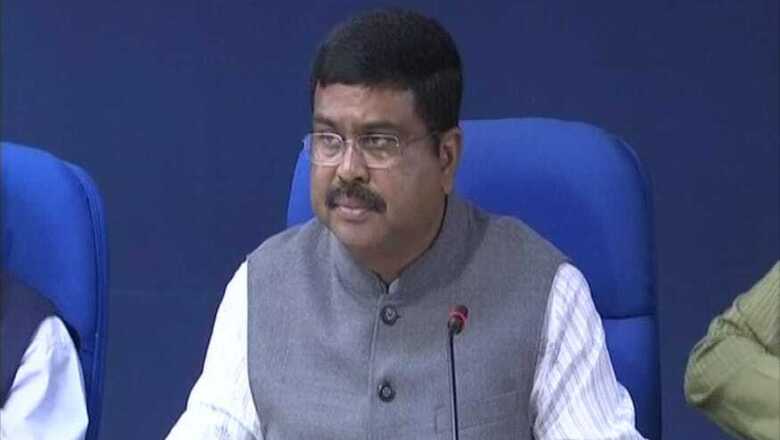
views
New Delhi: With the biggest attack ever on the Saudi oil industry creating volatility in the market, Petroleum Minister Dharmendra Pradhan on Thursday said securing affordable and sustainable energy tops agenda of "vulnerable" importing nations like India which were exposed to supply concerns.
India was able to secure most of its contracted supplies from its second-biggest oil supplier, Saudi Arabia, in the aftermath of the September 14 drone and missile assault on the Kingdom's main oil facility that knocked out about 5.7 million barrels a day, about half of the country's output.
"Today, we are meeting in the backdrop of a major oil and gas crisis resulting from attacks on Saudi oil processing plants at Abqaiq and Khurais," Pradhan said at the World Economic Forum here.
"The price volatility and concerns about sustained oil supplies made consuming countries vulnerable given the fact that India, along with most South Asian countries, have a major dependency on crude oil and gas imports. So, securing affordable and sustainable energy figures as a top agenda for all these countries, including India," he said.
While oil supplies from Saudi Arabia have not been impacted in the aftermath of the attack, liquefied petroleum gas (LPG) imports have been impacted. Saudi Arabia has deferred at least two shipments of LPG which India had to make up by importing from other countries such as the UAE and Qatar.
"It is only natural that the global energy deliberations pay close attention to the developments in the energy sector in India," he said. "This has a lot to do with the emergence of India as third-largest energy consumer in the world, and the fact that India is playing a leading role globally by implementing several transformative initiatives to reduce energy poverty in the country."
India, he said, recorded the highest growth of foreign energy investments in the world, which touched USD 85 billion.
Pradhan said in pursuit of a USD 5-trillion economy by 2024 from USD 2.9 trillion size now, it was imperative to increase energy availability to 1.3 billion people, whose per capita energy consumption is lower than the global average.
"The energy demand, thus, is estimated to grow at 4.2 per cent per annum up to 2035," he said.
The government's approach to energy policy, he said, covers four pillars of energy access, energy efficiency, energy sustainability and energy security.
"As part of our integrated approach towards energy planning, energy justice will also be a key objective in itself," he said. "As we reorient energy policies, in this age of unprecedented energy transition, we will lay emphasis on advancing inclusive access, secure, affordable and sustainable energy services."
Stating that the challenge ahead is daunting, he said close attention is being paid to innovation and clean energy.
"There is a definite need for integrating energy sources be it petroleum products, LPG or LNG (liquefied natural gas) in South Asia through regional electricity and gas grids," he said.
He said the commissioning of the India-Nepal petroleum products pipeline last month, helping the Maldives to change over to energy-efficient LED bulbs and transfer of hydropower from Nepal and Bhutan to India were examples of the government's 'Neighbourhood First' policy.
The minister said 8 crore free LPG connections to rural poor have helped increase coverage of environment-friendly fuel to 90 per cent of households in the country from 55 per cent five years ago.
"Our success in Ujjwala programme has attracted enormous global interest, including many developing countries keen to emulate this model of providing clean cooking fuel. Our immediate objective will be to enhance the use of LPG in the South Asia region. We will, for the first time, be sourcing LPG from Bangladesh for our northeastern states," he said.
India, he said, is now leading the global movement in embracing renewable energy sources and would have 100 gigawatts of solar generating capacity by 2022.
"Our target to transform India to a USD 5-trillion economy by 2024 requires a gradual and measured energy transition by deploying all sources of energy. We seek to provide energy justice to all in the country with wider supply of environmentally-compatible energy sources to its vast population," he said.


















Comments
0 comment